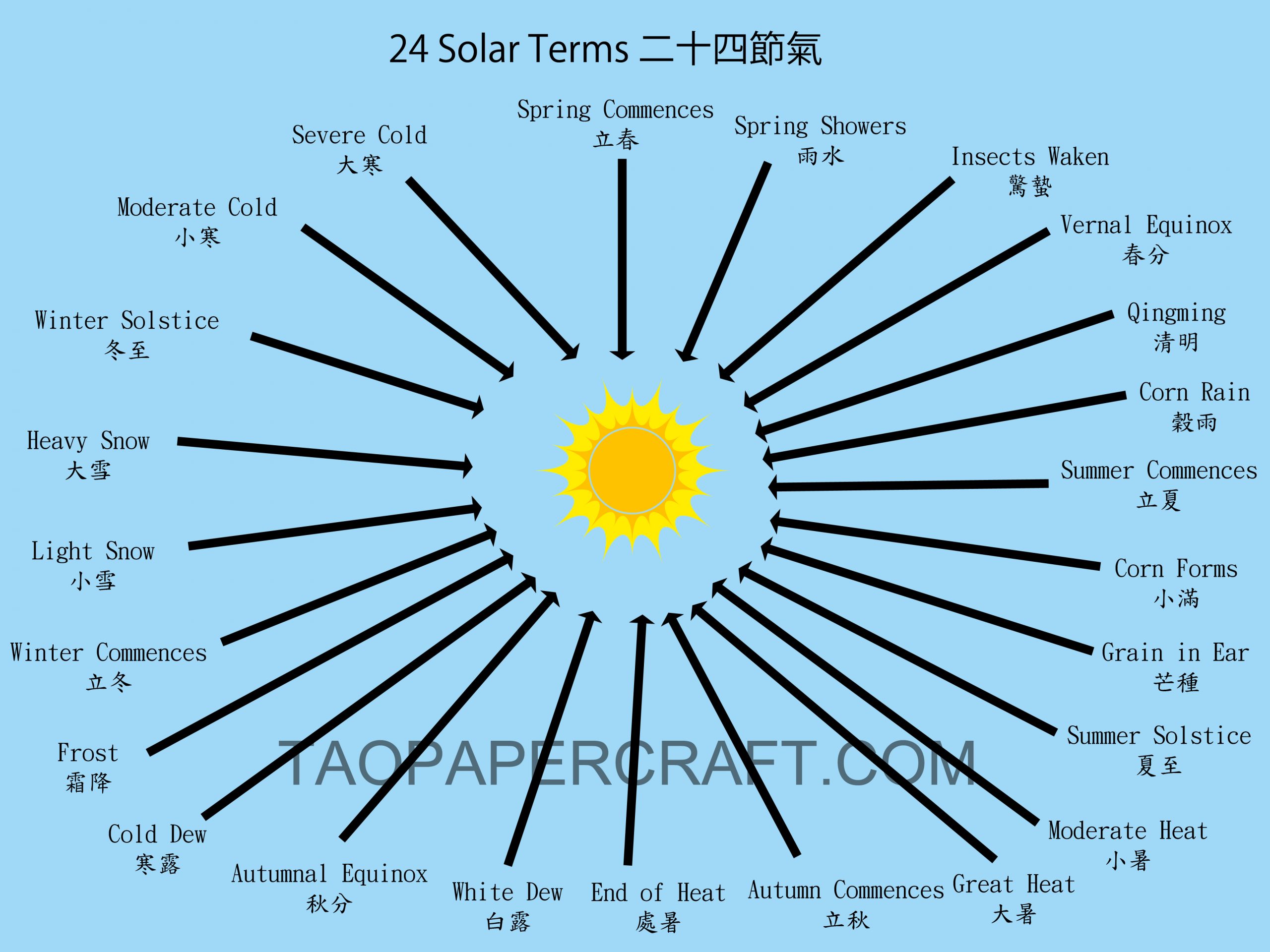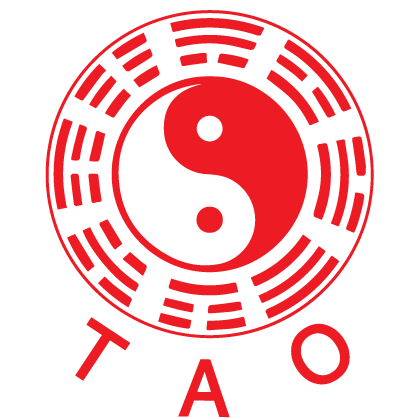
There are a total of 24 solar terms in each lunar year, according to Chinese tradition. These solar terms mark 24 distinct days throughout the year, each associated with a specific seasonal or weather phenomenon. They serve as guides for farmers to prepare and adjust their agricultural activities accordingly. Since the solar terms are closely linked to seasonal changes and are calculated based on the sun’s position along the ecliptic, many Taoist and traditional Chinese ceremonies are also scheduled to align with specific solar term dates.
The 24 solar terms are: Spring Commences, Spring Showers, Insects Waken, Vernal Equinox, Qingming, Corn Rain, Summer Commences, Corn Forms, Grain in Ear, Summer Solstice, Moderate Heat, Great Heat, Autumn Commences, End of Heat, White Dew, Autumnal Equinox, Cold Dew, Frost, Winter Commences, Light Snow, Heavy Snow, Winter Solstice, Moderate Cold, and Severe Cold.
Spring Commences
The 1st solar term, occurring when the ecliptic reaches 315°. This marks the beginning of spring and the traditional start of the lunar year. Farmers often begin their agricultural planning on this day.
Spring Showers
The 2nd solar term, at 330° ecliptic longitude. It is believed to bring increased rainfall, nourishing the land.
Insects Waken
The 3rd solar term, at 345°. Traditionally viewed as the moment when hibernating insects awaken, accompanied by thunder and warmer weather.
Vernal Equinox
The 4th solar term, at 0°. Day and night are equal in length. Rainfall gradually increases, and plants begin to sprout.
Qingming
The 5th solar term, at 15°. Qingming is both a solar term and a major cultural festival. Temperatures rise, making it ideal for farming. Families often go hiking or visit ancestral graves during this time.
Corn Rain
The 6th solar term, at 30°. The weather warms and rain becomes more frequent, fostering crop growth.
Summer Commences
The 7th solar term, at 45°. Marks the start of summer. Daylight exceeds nighttime hours.
Corn Forms
The 8th solar term, at 60°. Traditionally believed to be the time when fruit begins to form.
Grain in Ear
The 9th solar term, at 75°. Hot and dry conditions challenge barley and wheat growth. It’s the time to harvest and sow millet, which thrives in such climates.
Summer Solstice
The 10th solar term, at 90°. Marks the arrival of the year’s hottest period.
Moderate Heat
The 11th solar term, at 105°. Temperatures rise steadily but haven’t yet peaked.
Great Heat
The 12th solar term, at 120°. Considered the hottest day of the year. Heat-loving crops grow rapidly.
Autumn Commences
The 13th solar term, at 135°. Marks the start of autumn; temperatures begin to fall.
End of Heat
The 14th solar term, at 150°. Signals the end of summer heat and a gradual cooling of the weather.
White Dew
The 15th solar term, at 165°. Cooler temperatures bring early-morning dew on grass and leaves.
Autumnal Equinox
The 16th solar term, at 180°. Midpoint of autumn, where day and night are equal. Ideal for harvesting crops.
Cold Dew
The 17th solar term, at 195°. Cooler weather leads to dew forming into frost—signaling the start of winter’s approach.
Frost
The 18th solar term, at 210°. Temperatures drop sharply, and frost appears in many regions of China. Storm season ends.
Winter Commences
The 19th solar term, at 225°. Marks the start of winter. Crops are harvested, and animals begin hibernation. Rainfall decreases and temperatures plunge.
Light Snow
The 20th solar term, at 240°. Temperatures dip below freezing in some parts of China, and light snow begins to fall.
Heavy Snow
The 21st solar term, at 255°. Most regions experience heavy snowfall.
Winter Solstice
The 22nd solar term, at 270°. The year’s shortest day and longest night. In Chinese tradition, this day is as important as Lunar New Year and is celebrated with family gatherings.
Moderate Cold
The 23rd solar term, at 285°. Entry into the coldest phase of winter.
Severe Cold
The 24th and final solar term, at 300°. Considered the coldest day of the year.
根據中國傳統,每個農曆年共有二十四個節氣。這些節氣標示出一整年中具有氣候變化意義的二十四天,為農民提供種植與收成的參考依據。由於節氣與天氣息息相關,其日期是根據太陽在黃道上的位置計算而成,因此許多道教儀式與傳統民俗活動也常安排在特定節氣日舉行。
二十四節氣分別為:立春、雨水、驚蟄、春分、清明、穀雨、立夏、小滿、芒種、夏至、小暑、大暑、立秋、處暑、白露、秋分、寒露、霜降、立冬、小雪、大雪、冬至、小寒、大寒。
立春
第一個節氣,太陽到達黃經315°。代表春天開始,也是傳統上的一年之始。農民通常在這一天開始整地準備春耕。
雨水
第二個節氣,黃經330°。相傳此日降雨增加,有利於播種。
驚蟄
第三個節氣,黃經345°。象徵昆蟲因春雷而甦醒,氣溫回升,萬物萌發。
春分
第四個節氣,黃經0°。此日晝夜等長,雨量漸增,植物開始生長。
清明
第五個節氣,黃經15°。清明不僅是節氣,也是重要傳統節日。氣溫回暖,宜耕作。民眾習慣在此期間踏青與掃墓。
穀雨
第六個節氣,黃經30°。氣候溫暖,降雨量明顯增多,有利於穀物生長。
立夏
第七個節氣,黃經45°。夏季開始,白晝時間漸長。
小滿
第八個節氣,黃經60°。相傳此日部分農作物開始結穗。
芒種
第九個節氣,黃經75°。天氣炎熱乾燥,不利小麥與大麥生長。此時是適合種植粟、黍的好時機。
夏至
第十個節氣,黃經90°。進入全年最熱的階段。
小暑
第十一個節氣,黃經105°。氣溫漸高,但尚未達到最熱。
大暑
第十二個節氣,黃經120°。相傳為一年中最熱的一天。喜熱作物此時生長迅速。
立秋
第十三個節氣,黃經135°。秋季開始,氣溫漸降。
處暑
第十四個節氣,黃經150°。炎夏結束,氣候逐漸清涼。
白露
第十五個節氣,黃經165°。氣溫轉涼,清晨地面與葉片出現露珠。
秋分
第十六個節氣,黃經180°。秋季中段,晝夜平分。是收割的好時機。
寒露
第十七個節氣,黃經195°。天氣轉寒,露珠開始結霜,漸入初冬。
霜降
第十八個節氣,黃經210°。天氣轉冷,中國部分地區開始出現霜降,風暴季節結束。
立冬
第十九個節氣,黃經225°。冬季開始,農作物收成完畢,動物與昆蟲準備冬眠,降雨減少,氣溫驟降。
小雪
第二十個節氣,黃經240°。中國部分地區氣溫降至零度以下,開始飄雪。
大雪
第二十一個節氣,黃經255°。全國多地開始出現大量降雪。
冬至
第二十二個節氣,黃經270°。一年中白天最短、夜晚最長的一天。依中國傳統,此日與農曆新年同等重要,家人團聚共度。
小寒
第二十三個節氣,黃經285°。進入一年最寒冷的時段。
大寒
第二十四個也是最後一個節氣,黃經300°。傳說此日是一年中最寒冷的一天。
